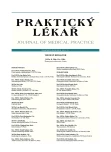Basics of social cognitive and affective neuroscience. XVI. Moral decision
Authors:
F. Koukolík
Authors‘ workplace:
Primář: MUDr. František Koukolík, DrSc., FCMA
; Národní referenční laboratoř prionových chorob
; Fakultní Thomayerova nemocnice s poliklinikou, Praha
; Oddělení patologie a molekulární medicíny
Published in:
Prakt. Lék. 2012; 92(3): 131-135
Category:
Editorial
Overview
The three main classic moral theories in Western thinking are
- virtue theory,
- deontology,
- utilitarianism.
- intuitive primacy but not dictatorship of emotions people make rapid evaluative judgements of others, moral judgement involves brain areas related to emotions, morally charged behaviour involves brain areas related to emotion, psychopaths have emotional deficits, people sometimes can´t explain their moral judgements, moral perceptual abilities emerge in infancy, manipulation of emotions changes judgements, reasoning is often guided by desires, research in political psychology and research on prosocial behaviour points to intuitions not reasoning,
- moral thinking is for social doing,
- morality binds and builds.
Key words:
moral theory, contemporary moral psychology, moral foundations theory.
Sources
1. Bowles, S., Gintis, H. The evolution of strong reciprocity: cooperation in heterogenous populations. Theor. Popul. Biol. 2004, 65, p. 17-28.
2. Boyd, R., Gintis, H., Bowles, S. et al. The evolution of altruistic punishment. Proc. Natl. Acad. Sci. USA 2003, 100, p. 3531-3535.
3. Boyd, R., Richerson, P. The origin and evolution of cultures. Oxford: Oxford University Press, 2005.
4. Casebeer, W.D. Moral cognition and its neural constituents. Nat. Rev. Neurosci. 2003, 4, p. 841-850.
5. Dawkins, R. The Selfish Gene. London: Oxford University Press, 1976.
6. Fehr, E., Fischbacher, U. The nature of human altruism. Nature 2003, 425, p. 785-791.
7. Fehr, E., Gächter, S. Altruistic punishment in humans. Nature 2002, 415, p. 137-140.
8. Fehr, E. Don´t lose your reputation. Nature 2004, 432, p. 449-450.
9. Fischbacher, U., Gächter, E., Fehr, E. Are people conditionally cooperative? Evidence from a public good experiments. Econ. Lett. 2001,71, p. 397-404.
10. Fiske, A.P. Structures of social life. New York: Free Press, 1991.
11. Gintis, H. Strong reciprocity and human sociality. J. Theor. Biol. 2000, 206, p. 169-179.
12. Greene, J., Sommerville, R.B, Nystrom, L.E. et al. An fMRI investigation of emotional engagement in moral judgement. Science 2001, 293, p. 2105-2108.
13. Greene, J., Haidt, J. How (and where) does moral judgement work? Trends Cogn. Sci 2002, 6, p. 517-523.
14. Greene, J.D., Nystrom, L.E., Engell, A.D. et al. The neural bases of cognitive conflict and control in moral judgement. Neuron 2004, 44, p. 389-400.
15. Greene, J.D., Paxton, J.M. Patterns of neural activity associated with honest and dishonest moral decisions. Proc. Natl. Acad. Sci. 2009, 106, p. 12506-12511.
16. Haidt, J. The new synthesis in moral psychology. Science 2007, 316, p. 998-1001.
17. Haidt, J., Kesebir, S. Morality. In: Fiske ST, Gilbert D. The handbook of social psychology. 5th ed. Hoboken: Wiley and Sons, 2010.
18. Hill, T. Human wellfare and moral worth: Kantian perspectives. New York: Oxford University Press, 2002.
19. Koenigs, M., Young, L., Adolphs, R. et al. Damage to the prefrontal cortex increases utilitarian moral judgements. Nature 2007, 446, p. 908-911.
20. Koukolík F. Lidství. Neuronální koreláty. Praha: Galén, 2010.
21. Koukolík F. Mocenská posedlost. Praha: Karolinum, 2010.
22. Maynard-Smith, J. Group selection and kin selection. Nature 1964, 201, p. 1145-1147.
23. Maynard-Smith, J. The origin of altruism. Nature 1998, 393, p. 639-640.
24. Maynard-Smith, J., Szathmáry, E. The Major Transitions in Evolution. New York: Oxford University Press, 1997.
25. Moll, J., Oliveira-Souza de R., Moll, F.T., et al. The moral affiliation of disgust. A functional MRI study. Cog. Behav. Neurol. 2005, 18, p. 68-78.
26. Richerson, P.J., Boyd, R. Not by genes alone: How culture transformed human evolution. Chicago: University of Chicago Press, 2005.
27. Sanfey, A.G., Rilling, J.K., Aronson, J.A. et al. The neural basis of economic decision-making in the ultimatum game. Science 2003,300, p. 1755-1758.
28. Sanfey, A.G., Loewenstein, G., McClure, S.M. et al. Neuroeconomics: Cross-currents in research on decision-making. Trends Cogn. Sci. 2006, 10, p. 108-116.
29. Schwarz, S.H. Universals in the content and structure of values. In M. P. Zanna (Ed.). Advances in experimental social psychology 1992; 25 : 1-65. New York: Academic Press, 1992.
30. Shweder, R.A., Much, N.C., Mahapatra, M. et al. The „big three“ of morality (autonomy, community, and divinity), and the “big three” explanations of suffering. In A. Brandt and P. Rozin (Eds.) Morality and health. New York: Routledge, 1997, p. 119-169.
31. Williams, G.C. Adaptation and natural selection: A critique of some current evolutionary thought. Princeton, NJ: Princeton University Press, 1996.
Labels
General practitioner for children and adolescents General practitioner for adultsArticle was published in
General Practitioner

2012 Issue 3
- Advances in the Treatment of Myasthenia Gravis on the Horizon
- Hope Awakens with Early Diagnosis of Parkinson's Disease Based on Skin Odor
- Memantine in Dementia Therapy – Current Findings and Possible Future Applications
- Memantine Eases Daily Life for Patients and Caregivers
- Possibilities of Using Metamizole in the Treatment of Acute Primary Headaches
-
All articles in this issue
- Basics of social cognitive and affective neuroscience. XVI. Moral decision
- Medicine on the invisible web
- The influence of ageing on cognitive functions and their evaluation in general practice
- ECG changes during endoscopic procedures in upper gastrointestinal tract
- Nursing interventions in home care
- The attitudes of general practitioner’s regarding physical activity promotion
- Testicular microlithiasis
- General practitioner and rehabilitation
- Treatment of sexual dysfunctions in patients with chronic kidney disease
- Current possibilities for endovenous treatment of lower extremities’ varices
- Relaxation techniques: what relax and why
- General Practitioner
- Journal archive
- Current issue
- About the journal
Most read in this issue
- Testicular microlithiasis
- Nursing interventions in home care
- The influence of ageing on cognitive functions and their evaluation in general practice
- General practitioner and rehabilitation
